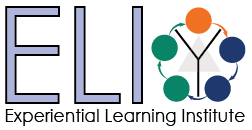The Experiential Learning Institute (ELI) loves getting into the nitty-gritty of teaching and learning. In addition to offering resources like mentorship and grant funding for projects, ELI works with faculty and staff to reimagine experiences, activities and assignments. Sometimes, we get the joy of working closely with someone who is looking to completely transform an entire course, which is exactly what Engineering Instructor, Jay Smith, did in Fall, 2020. This was a win-win-win for everyone involved, including students and our campus community.
Jay decided to rework EGR101, a 1 credit course, to be completely experiential in its approach. After finding that typical approaches left him and his students wanting more, he took the plunge. He incorporated knowledge and practices of the learning cycle, team learning and professionalism, and, partnering with NMC’s Academic and Career Advising Center, Jay and his students helped them consider design options for their space in the Osterlin Building. Students interviewed all relevant stakeholders, like students and ACAC staff and administration, to learn as much as they could to put into their designs. Their work was shared during class presentations where everyone was invited to hear the results. The included technical drawings, survey and interview findings, and their approach to teams’ designs.
“I was a fan that our class was focused on solving an actual issue and centered around a real world experience. I know it’s difficult to do that often, however I felt that was very interesting and made me feel prepared for the actual field I was entering,” one EGR101 student remarked.
Jay said, “I see the project as a success in many ways. Most significantly, it allowed the students to take part in the engineering design process while working on improving the world around them, which is really the essence of engineering as a career.”
 This is a big step for any instructor. Jay found ELI support to be what he needed to take next steps. “During the planning process, they helped to recruit partners, provided feedback on activities, and made sure the project included all aspects of the experiential learning process. Throughout the semester, the support continued by attending student presentations, providing feedback, and speaking to the class on the topics of teamwork and professionalism. They really helped to turn this into a great experience for the students!”
This is a big step for any instructor. Jay found ELI support to be what he needed to take next steps. “During the planning process, they helped to recruit partners, provided feedback on activities, and made sure the project included all aspects of the experiential learning process. Throughout the semester, the support continued by attending student presentations, providing feedback, and speaking to the class on the topics of teamwork and professionalism. They really helped to turn this into a great experience for the students!”
Contact the ELI to find out more about how we can support any move you might want to make in your courses or departments, including enrollment in EL101, a self-paced Moodle-based course on experiential learning. From the smallest to the biggest changes, experiential learning connects learners to themselves, their fields and their worlds.

